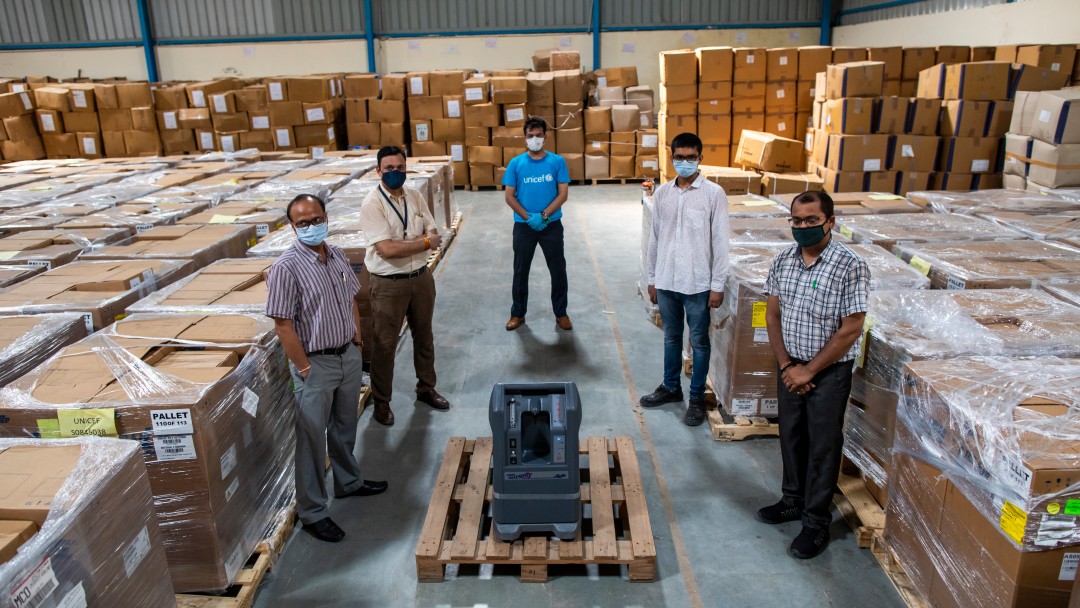News from 2020-11-25 / KfW Development Bank
KfW supports preparations for COVID-19 vaccination in India

The success in the development of vaccines against COVID-19 and the prospect of their availability in the near future gives hope worldwide. The severely affected, densely populated developing countries and emerging economies in particular will need a vaccination - and a great deal of international support in its implementation. The recent G20 summit has confirmed this in view of the adopted Covac vaccination initiative. The upcoming vaccination campaigns require a major logistical effort already now. KfW is supporting this by providing 15 million euros from funds of the Federal Ministry for Economic Cooperation and Development (BMZ) to prepare for COVID-19 vaccination in India, an international corona hotspot. A financing agreement with UNICEF was signed for this purpose on 17 November 2020. The funds are earmarked for the UNICEF Response Plan to the COVID-19 pandemic, which will support the Indian government in combating COVID-19 and cushioning the consequences of the pandemic for the population.
A key challenge is to provide for a continuous cold chain to ensure that the vaccine works. India has deficits in this respect - under the current circumstances, a vaccine could not even be distributed nationwide.
Accordingly, the funding will be used to improve the medical cold chain in order to prepare the health system for the introduction of a COVID-19 vaccination. To this end, the procurement of refrigerators and freezers for around 1,000 sites across the country will be financed. The equipment procured ranges from small refrigerators for individual health stations to walk-in cold rooms for storing larger quantities at district level. The overall aim is to ensure that the vaccine can be distributed throughout the country.
In addition, the procurement of PCR testing equipment and measures to strengthen human resource capacity in the health sector will also be funded. These measures not only help to absorb the burden of the pandemic in the short term, but also contribute to strengthening the Indian health system in the long term.
Already in the first phase of the project, EUR 15 million from BMZ funds were provided through UNICEF to procure urgently needed medical equipment. Within a very short period of time, this allowed for the procurement of around 325,000 COVID-19 tests, more than 3,000 oxygen concentrators and protective equipment for 22,000 health workers. The second phase should now build on the successful first phase - a good start for a hopefully rapid upward trend at the end of the Corona year 2020.
Update
On 3 August 2021, a funding agreement was signed with UNICEF on behalf of BMZ to scale up a second phase of the COVID-19 Crisis Response Programme in India to the tune of EUR 10 million.
India is the country with the second highest number of registered people infected with the coronavirus in the world. Especially the second wave has hit India's population hard, with peaks of more than 400,000 newly infected people in one day. The overburdening of the health system and the risk of a further increase in infections pose major challenges for the country. Against this backdrop, the Government of India has set a goal to accelerate the containment of the COVID-19 pandemic by scaling up the national vaccination campaign. Since 1 May 2021, prioritisation for vaccination has been lifted and all adults above 18 years of age are entitled to be vaccinated.
The BMZ's financial contribution is primarily used to expand the medical cold chain. This primarily involves financing procurements that focus on the storage and transport of vaccines "over the last mile", as studies show that this is where interruptions in cooling or freezing of vaccines most frequently occur. Specifically, walk-in cold rooms, solar-powered refrigerators, smart vaccine carriers and voltage regulators to meet specific local conditions (regions without reliable power supply) or the high demands of vaccines (storage at temperatures of -60 to -80 degrees Celsius). In addition to equipment to maintain the cold chain, 100 RT-PCR testing devices will also be funded to test individuals for COVID-19 infection. These will address the problem that conventional rapid tests (e.g. rapid antigen tests) often have a comparatively high error rate. In comparison, tests carried out using the PCR method provide more reliable results, which enables more targeted isolation of infected individuals.

Share page
To share the content of this page with your network, click on one of the icons below.
Note on data protection: When you share content, your personal data is transferred to the selected network.
Data protection
Alternatively, you can also copy the short link: https://www.kfw-entwicklungsbank.de/s/enzBWrMC.CXAA
Copy link Link copied